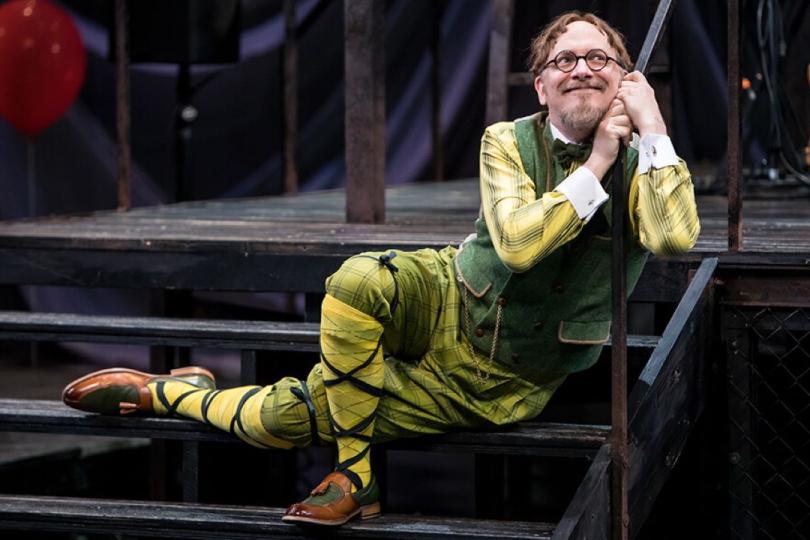SPLASH! Twelfth Night at The Guthrie

I am someone who wishes the Guthrie would put on more productions of Shakespeare– mostly because the best productions of Shakespeare I’ve seen in Minnesota were put up at the Guthrie. The production of Twelfth Night currently playing at The Guthrie has a stellar cast (which is usual for the theater) with a stunning performance by Emily Gunyou Halaas at its center. Beyond that, I felt that it did not live up to my expectation, or the high standard set by recent of the theater’s productions of Shakespeare’s plays (e.g. Romeo and Juliet, King Lear or Hamlet). The main problem with Guthrie’s Twelfth Night is that it lacks thematic, stylistic and aesthetic coherence. It is incredibly challenging to highlight all the layers in a Shakespeare play at once and so strong productions will make choices. This Twelfth Night doesn’t appear to know what it’s trying to say, and instead of making a few thoughtful choices, throws many ideas at the wall, desperate for one to stick.
Let’s start with aesthetics. The set a three-story wooden structure looks a little like a climbing park you might see in a modern playground. It has a rounded walkway that swings downstage and back around a foot-deep pool of water. Because the actors often are speaking their lines from the downstage part of walkway back towards characters standing on the wooden structure – speaking upstage – too often the dialogue is hard to make out. Losing lines like this is bothersome in any production, but in a Shakespeare play it is especially unfortunate. The excellent Tyson Forbes, playing Antonio, was one of only several actors whose every line was clearly heard from all positions on the stage (due to his deep, booming voice). To the right of the wooden structure there is a wide wooden swing which hangs from the ceiling. The swing and the pool of water appear to gesture to the play’s themes of sexual fluidity and gender trouble, without really saying much more than that they exist. I was not a big fan of the costume design. The fool/jester character, Feste (Luverne Seifert) is dressed like a Barnum and Bailey circus clown, Maria wears a Day-Glo orange Raggedy Ann-ish wig, Olivia is dressed in an elegant evening gown, and I am not sure what Sir Toby’s plaid pants are suggestive of or what era they belong to.
There are also a lot of balloons. Between the balloons, the swing, and actors kicking up the water like schoolchildren walking through puddles, the clear tone is one of playful frivolity. The play, however, gets in the way. In the play, the frivolity and celebration of sociability is undercut on the one hand by the themes of death and mourning and on the other hand (spoiler alert) by the events involving the stage Puritan Malvolio (Jim Lichtscheidl). Near the end of the play, Malvolio is released (he has been locked up in complete darkness) where he is interrogated and repeatedly shocked when taunting characters pop balloons near and around his head–a practical joke that clearly went too far. Released, Malvolio stumbles forth, right into the scene of the play’s comic resolution (when the knot of mistaken identities and superficial affections is finally untangled, true lovers are matched correctly, and marriage transpires or else is immanent). The brightness of daylight still burning his eyes, Malvolio says: “Madam, you have done me wrong. Notorious wrong.” And he is right. The “Malvolia moment” is meant to arouse a sense of unease that disrupts the revelry. In most productions I’ve seen, a director provides some guidance as to how to interpret and react to the injustice of what has basically been torture. Productions usually addresses that in the midst of this concluding celebration of love, torture and unfairness still abound. For a moment I thought perhaps the Director (Tom Quaintance) was trying to say something about our own moment – where the leader of the ruling party does endorse or at least tolerate torture (e.g., families separated at the border) – but there is no follow-through on that idea at all. To the contrary, the cast barely reacts to Malvolio’s recounting of what he has endured. When he leaves the stage, there is barely a beat before Maria presents her dismissive rationalization for the cruelty that has ensued and then poof, it is forgotten. No unease hangs in the air. Almost immediately we are back to confetti and splashings. Balloons fall down from the ceiling and love resumes.
The intrusions of darkness into merry-making are customary in the festive endings of Shakespeare’s “festive comedies.” There is almost always something to impede love’ perfection, whether it is the intrusion of a melancholic finding himself unable to join in, or oblique reminders of cold-heartedness, or even violence in the lyrics of the wedding song that ends the play [real spoiler alert]:
When that I was and a little tiny boy,
With hey, ho, the wind and the rain,
A foolish thing was but a toy,
For the rain it raineth every day.
But when I came to man's estate,
With hey, ho, the wind and the rain
'Gainst knaves and thieves men shut their gate,
For the rain, & c….
Shakespeare’s endorsement of human sociability is partial at best and in Twelfth Night especially, he conveys the ease with which revelry can slip into cruelty. And that dark theme, threaded throughout Twelfth Night is, regrettably, not given its due in this production.
In between the balloons, torture and weddings, a lot does happen. In the original play, Shakespeare begins with the arrival of Viola (Emily Gunyou Halaas) on the island, but Quaintance opens this production instead with a brief portrayal of the tempest and the shipwreck that separate the heroine from her male twin Sebastian (Michael Hanna) – with the increasing overused device of having actors wave banners of shiny fabric to suggest a storm at sea. The shipwrecked Viola arrives on the fictional Island of Ilyria. While devastated to have lost her beloved sibling, Viola immediately senses that the island might not be safe for a young woman travelling alone. She decides to take on a male persona, Cesario, for self-protection. She offers herself as a servant to Duke Orsino (Nate Cheeseman), with whom she immediately falls in love. Orsino sends Cesario to woo Olivia (Sun Mee Chomet), who is the object of his superficial, Petrarchan love. Cesario unintentionally elicits the adoration of Olivia, completing the hopelessly silly triangle. To make things more convoluted, Sebastian shows up on another part of the island, having been saved by Antonio, an accused criminal on the lam. “Time thou must untangle this not I,” Viola muses. “It is too hard a knot for me to untie.” Time obligingly does untangle things—by the end of Act V!
On a basic level the play is about love – or at least the varieties of love: lost love, superficial love, authentic love. In the case of Duke Orsino’s friend Sir Toby (Sally Wingert) and the scheming and ambitious house servant, Maria (Sarah Jane Agnew) – mercenary love. Some of the expressed love on stage is more convincing or more poignant than others. Halaas brings to Viola a gorgeous sensation of lostness that answers well to the character’s situation, and to the undercurrent of death and mourning that runs through the play. Cheeseman’s portrayal of Duke Orsino’s shallow, pre-Juliet-Romeo-esque romantic yearnings contrast well with the depth of feeling Halaas brings. She lets us see how much Viola’s service and tendency to self-abnegation is bound up with mourning for her twin and for her home. It is this same sense of loss that draws Olivia to Ceasario/Viola. the two are both sisters mourning for dead brothers. Olivia hides her grief behind a veil; Viola must don a full disguise from head to toe.
The play has its share of famous lines: Twelfth Night starts with Duke Orsino declaring: “If music be the food of love, play on.” And in the forged letter that tricks Malvolio, he is told: “some are born great, some achieve greatness, and some have greatness thrust upon 'em.” And, of course, the play has buckets of gender fluidity. (Many modern interpretations emphasize the sense of liberation that assuming of male identity affords Viola in the patriarchal island/world. But within the confines of this particular story, Viola comes to find her male trappings constraining: “As I am man,/My state is desperate for my master's love;/As I am woman, –now alas the day!” Despite this play’s use of gender-bending, it has sometimes been seen to have a deeply conservative core. One reason Malvolio is considered worthy of punishment is that he dares to believe that an aristocratic lady could possibly be interested in him, a mere servant.
As already noted, there are many very fine performances. Lichtscheidl as Malvolio is superb, at turns pathetic, hysterical, and profoundly poignant. And Halaas gives an absolutely brilliant performance as Viola. She lends her character such extraordinary depth and emotional complexity that she almost saves the show from dissolving into airy nothings. Chomet does lovely work too, conveying how divided Olivia feels from her relentlessly objectified beauty. Rather than play up Sir Toby’s bacchanalian facets, Sally Wingert emphasizes the character’s deep cynicism and aristocratic disgust.
While this wonderful cast tries to breathe life into this production, it feels like they were often swimming in different directions. Distractingly clad, given a set (while surfeit with symbolism) that poorly serves their vocal talents, and lacking clear directorial choices about which themes to foreground and how to integrate the darker undertones, overall this production did not manage to resonate with me. The impression one gets is of a jumble of pieces that, while often novel and individually impressive, do not fit together. This is not an effect of Shakespeare’s ambiguity, but a lack of focus on the part of the creative team.




